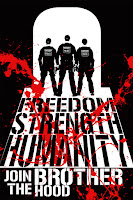Ross Schonberg
Ms. Gubanich
Western Literature
October 8, 2015
Big Brother & Brotherhood Parallel
Anyone who
has read (or is reading) the book 1984 knows
that Winston, the main protagonist of the story, is trapped in Oceania, more
specifically Air Strip One, which used to be London. The political party that
keeps its people in line is known as Big Brother. As you read deeper into the
book you begin to hear of this group known as the Brotherhood, which is a group
of people who are against Big Brother and are run by Emmanuel Goldstein, a
former party member who turned against the party. Winston believes that the
Brotherhood is so different from Big Brother, but really when you look at the
big picture are they really that different and is one better than another?
There might be more similarities than Winston (and the readers) think.
First one
of the major similarities between the two groups is following orders. As soon
as Winston meets with O’Brien he is informed about how the Brotherhood exist
and the famous names that are associated with it. After being introduced to it
all O’Brien ask Winston and Julia a series of questions. Some examples would
“You are prepared to give your lives?” ‘Yes’. ‘You are prepared to commit
murder? ‘ ‘Yes.’ ‘To commit acts of sabotage which may cause the deaths of
hundreds of innocent people?’ “Yes” (172). So just like with the Thought
Police they will work for Big Brother, they just answer the questions with a
resounding yes, almost without hesitation, and will do all of those crazy
things for some belief. With both groups having this kind of power can allow
them to change people mentally or physically. The mental side of it is when Big
Brother will take people away, but them bring them back into Oceania and they
will seem as if they are someone else entirely. What the Brotherhood is saying
they do is that they will change people’s facial features to make them become a
whole new person. Both the Brotherhood and Big Brother are kind of ideas, as O'Brien says "The Brotherhood can not be wiped out because it is not an organization in the ordinary sense. Nothing holds it together except an idea which is indestructible" (176). Another one of the big parallels I noticed was in the party
no one ever sees Big Brother in person. Just like with Big Brother no one who
is apart of the brotherhood (that we know of) has ever seen Emmanuel Goldstein.
Another parallel between the two groups is shown personally through Winston experience
with the wine. As he states in the book "For some reason he had always thought of wine as having an intensely sweet taste, like that of blackberry jam, and an immediate intoxicating effect. Actually, when he came to swallow it, the stuff was distinctly disappointing" (171). The wine is the parallel with the brotherhood, as that he has
been waiting for it for so long and now that he has it (or joins it) he doesn’t
find it as interesting as he thought it would.
So in conclusion, I’m not entirely
sure witch group I would prefer to be apart of. I’m not saying that I would
like to live in this society, but I can see hardly any difference between the
two. If the brotherhood were like that underground society of rebels who had
fun and did illegal things against the government in a way that would be
creative than that would be a good idea to join the brotherhood, but no. Living
with the party seems to allow you to have at least some conditions that could
be better than the brotherhood.


No comments:
Post a Comment